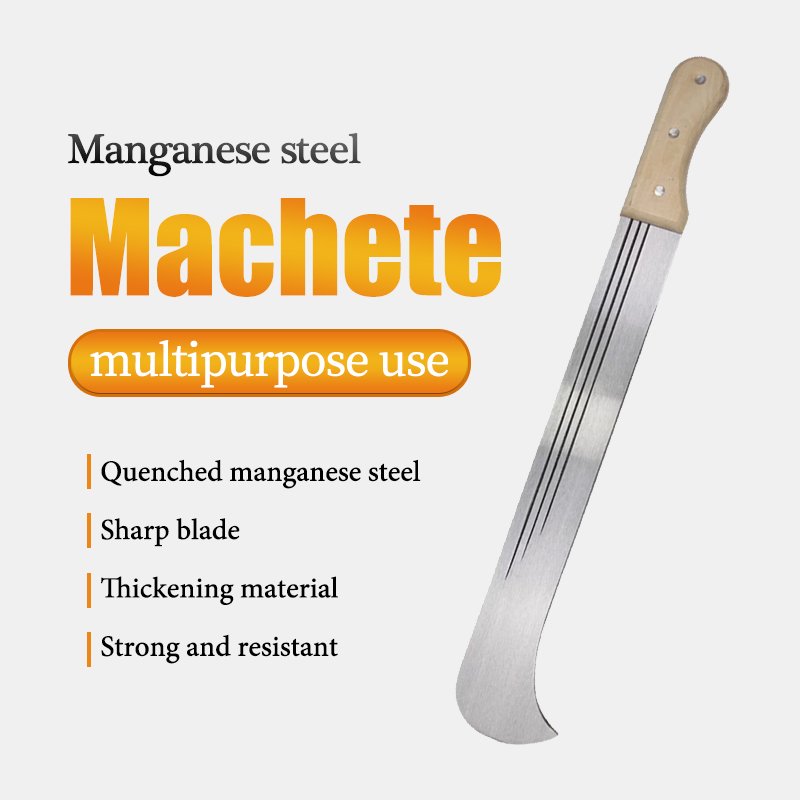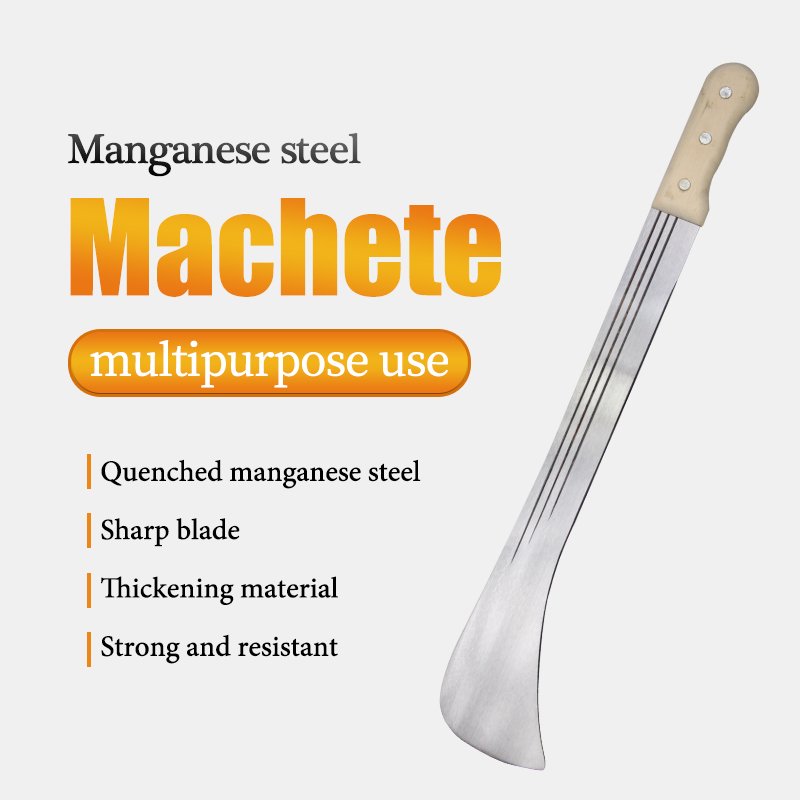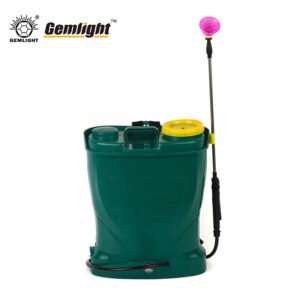1. The Role of a Brush Hook Machete in African Agriculture
In the diverse landscapes of Africa, where dense vegetation, sprawling bushland, and rapidly growing vines are common, having the right cutting tool is essential for efficient fieldwork. Among the most dependable tools for smallholder farmers and plantation workers is the brush hook machete. Known for its curved blade and sharp inward hook, this tool offers an ideal solution for clearing thick undergrowth and pruning woody plants.
The design of the brush hook machete is particularly suited for handling the types of vegetation commonly found across African farmlands — from cassava stems and plantain shoots to sugarcane fields and invasive shrubs. Its hooked blade allows users to pull and slice in a single motion, reducing fatigue and increasing productivity. Whether used in rural homesteads, family farms, or mid-scale plantations, this tool provides excellent leverage and cutting control in areas where motorized equipment may not be feasible.
Additionally, the lightweight version of the brush hook machete is especially valued in regions where extended manual labor under the sun is the norm. Farmers prefer it for daily maintenance tasks like boundary clearing, fence line management, and removal of overgrown paths between crop rows. The brush hook machete has become a cornerstone of field equipment for millions of African workers, thanks to its versatility, portability, and effectiveness in both wet and dry terrain.
As labor-intensive agriculture continues to play a major role in food production across the continent, the demand for durable, functional, and lightweight machetes remains strong. For distributors and importers in Africa, sourcing high-quality brush hook machetes at competitive prices is key to supporting this vital sector.

2. Why Choose a Machete with a Hook for Daily Farm Work?
Selecting the right tool for field operations can significantly impact both efficiency and long-term labor costs. Among various machete styles available, the machete with a hook stands out due to its unique functional design that combines cutting, pulling, and pruning capabilities. Unlike straight-edged machetes that rely on chopping motions, a hook-style blade enables the user to catch and draw vegetation inward before slicing — an essential function when clearing vines, briars, and entangled shrubs.
In daily farm work across African terrains, this type of machete proves especially useful for managing dense foliage and tight spots, such as between cassava rows, in banana groves, or along irrigation ditches. The hooked tip is not just for cutting — it allows the farmer to grip creeping plants and drag them aside, improving visibility and reducing the need for repeated chopping. This is particularly important in resource-limited settings where labor must be efficient, and tools must be reliable.
Additionally, the machete with a hook offers safety advantages. Its curvature minimizes blade slippage and keeps cutting focused within a controlled area. It also enables workers to prune branches from overhead without standing directly underneath falling debris. When combined with a lightweight design, this machete reduces fatigue during long hours of work, enhancing both safety and productivity.
The rise in demand for versatile cutting tools in regions like West Africa, Central Africa, and parts of East Africa has driven many buyers and resellers to seek customizable hook machete models that are suitable for rugged field conditions. Tools that are both effective and comfortable to use represent a strong value proposition — and the machete with a hook meets this demand perfectly.

3. Factory-Direct Hook Machete Solutions from Our Company
As a seasoned manufacturer with over 30 years of experience in agricultural tools, our company specializes in producing and exporting hook machetes tailored for the unique challenges of African farming. We understand the terrain, the crop types, and the specific tasks farmers face — from clearing dense brush to managing sugarcane fields. That’s why we have developed a range of lightweight, high-efficiency hook machetes that combine functionality, durability, and affordability.
Our most popular models include:
- Lightweight Brush Hook Machete (14″–18″) – Designed for daily farm tasks, this model features a curved carbon steel blade, anti-rust coating, and a non-slip hardwood or plastic handle for extended use in wet or dry conditions.
- Custom Machete with a Hook Tip – Suitable for region-specific vegetation, this model is fully customizable in length, thickness, and handle material. It’s a popular choice among distributors looking for OEM branding.
- Billhook-Style Machete with Reinforced Back Spine – Offers enhanced cutting power and is ideal for tougher crops like sugarcane, maize stalks, and dry woody shrubs.
Our production line operates with strict quality control, and we support bulk orders with flexible shipping options to African ports. We provide full customization, including blade stamping, packaging design, and handle colors, allowing you to offer a branded machete that resonates with your market. Whether you’re a regional importer, hardware chain, or agricultural cooperative, our factory-direct solutions ensure timely supply and competitive pricing.
By working directly with our factory, you eliminate unnecessary intermediaries, reducing cost while maintaining full control over quality and delivery schedules. Contact us today for a quote or to request samples of our hook machete models.

4. What Is a Billhook Machete Used For in Rural Africa?
The billhook machete, often referred to as a traditional curved machete with a hooked blade, plays an essential role in the day-to-day operations of many African farmers. Its distinctive shape — a combination of axe-like heft and scythe-like curvature — makes it ideal for a wide variety of agricultural tasks, especially in rural settings where manual tools dominate.
Primarily, the billhook is used for pruning fruit trees, harvesting sugarcane, clearing paths through dense bush, and processing animal feed. Its hooked tip allows the user to pull down vines and branches, while the inner edge provides a powerful slicing motion. In many West African regions, billhook machetes are used in cocoa and oil palm plantations to cut fronds and manage undergrowth. In East Africa, they are commonly seen in banana fields and maize cultivation areas.
What sets the billhook machete apart from other types is its multi-functionality. It serves as a clearing tool, a harvesting blade, and even a fencing aid when farmers need to chop stakes and saplings for boundary markers. Despite its robust build, modern versions — especially lightweight models — allow for one-handed operation, which is essential during long work sessions.
The billhook machete is also deeply embedded in rural African culture. It’s not just a tool — it’s part of a farmer’s daily attire, often carried into fields alongside seed bags and water containers. For suppliers and retailers, offering a durable, ergonomically designed billhook is a way to meet deep-rooted user expectations while improving performance.
If you’re sourcing agricultural tools for African markets, make sure the billhook machete is part of your product mix. Its proven utility and wide adoption ensure it remains in constant demand.
About us:
Dingzhou Gemlight Cutting Tools Co., Ltd.,With a solid foundation since 1990, Gemlight machete is a trusted name in the field of cane machete manufacturing. We focus on R&D, design and production to produce high quality wholesale china machete and shovel,hoe,pickaxe,sickle,farm tools.
Gemlight Machete factory Based in Baoding, Hebei, China, we benefit from efficient logistics and fast delivery. Our products have been well received in more than 50 countries, thanks to our commitment to customer satisfaction




